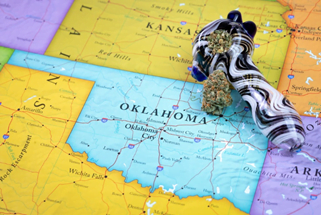Who Can Obtain Medical Weed
Most every state with medical marijuana laws boasts a strict list of conditions that qualify patients for access to medical weed. Often, these lists include exceedingly uncomfortable diseases and disorders, like cancer, wasting syndrome, multiple sclerosis, seizures or glaucoma — all of which lack a simple, straightforward treatment, let alone cure. For these sufferers, marijuana is permitted for masking the worst symptoms of ill-health and managing day-to-day well-being, and the list of conditions is meant to strictly limit access to marijuana to only the most serious cases.
Oklahoma has a similar list of qualifying conditions — but unlike in other states, Oklahoma gives doctors full discretion in determining what is best for their patients. As a result, even if a patient does not suffer from something like chronic pain, severe nausea, Crohn’s disease or HIV, doctors can recommend them for a medical marijuana license. This makes it much easier for the average adult to obtain a medical marijuana card, given they can convince their physician of their need — or else see a doctor known for being generous with weed recommendations.














